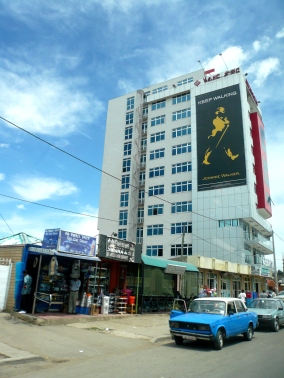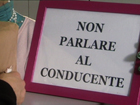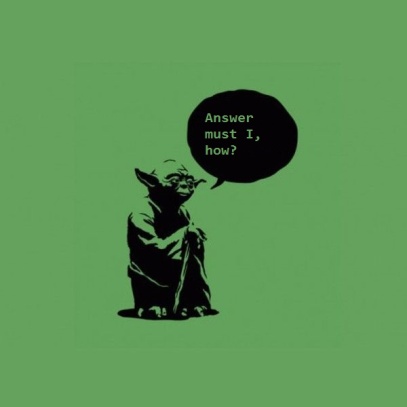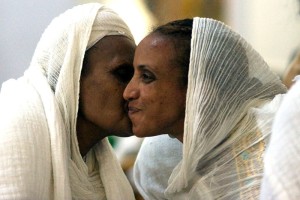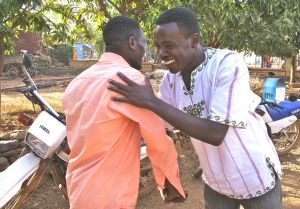Do you remember the Truman Show’s scene: “Good morning! Oh and in case I do not see you good afternoon and good night!”?!
Well, I’m living that scene on a daily basis. Seriously. Arriving in the States I expected being overturned by the many little details, the many cultural differences and distances. And yet I continue getting shocked, learning and uncovering cards, good and bad ones. The way of greeting, and especially greeting strangers, is definitely in my top 10.
As a good roman (we do have an attitude, it’s all true!) just landed on American soil, when going for a walk or just on the way to the bus stop, I used to get astonished and confused by the various: “Hi”, “How you doing?”, “Morning”, “Afternoon” and so on … all garnished with big and friendly smiles. I was so confused that I’ve randomly answered with some very polite “I think you confused me with somebody else!” or “ Hi, but I don’t know you, do I?”, while playing in my mind the amazing scene from La Haine (taken from Taxi Drivers)
I don’t know you, why are you greeting me and furthermore smiling? All that cordiality among strangers, all those free smiles where not really clear to me. After all in Rome if you dare to sort of smile to someone you will probably hear something like “what the hell are you smiling at?” or “ do I have something funny in my face?!”, with that typical attitude I was talking about before! So, greeting a stranger?! Why in the world? Of course the neighbour, the butcher, the veggie seller, the bus driver you see every day, you can do that! But a complete stranger, someone you have never seen before and you will never meet again, why???
Would you ever suspect that greeting a bus driver can lead you to peculiar situations?!
After living in Ethiopia for some months, I started using the famous mini-bus. In Addis you can either move around with taxi, mini-bus or regular size bus. The regular size bus is really not advisable for ferengis (foreigners), mainly for two reasons: 1- you’ll get flees; 2- most likely you’ll get out completely crumpled, IF you’ll manage to get out (!!).
Taxi has its cost, although compared with our fares they sound cheap, when you live there you don’t feel like throwing your Birr (local currency) away!
So mini-bus it is. The mini-bus are born to fit 9 people, but normally they get filled with about 15. While regular buses have stops just like in here or Italy, mini-bus are ambiguous. Kind of anarchist means of transport. There are areas where they most likely are expected to pass by and stop. Basically, you wait where you find other people already waiting, in an area where it’s known that they pass.
Now I’ve been told the system has slightly changed, but when I used to live in Addis mini-bus did not have any banner giving you the information about their direction or provenance. There was a man out of the main door’s window yelling the final destination and an idea of the areas where the bus would be passing. In Amharic off course! After studying carefully by listening and observing for entire afternoon the mini-bus routines, after taking the mini-bus several times with friends and colleagues, I finally gather my guts and embarked myself on, to go to work. I knew where to wait. I missed something around 10 chances to get in ‘cos I was not sure I had really understood the yelled destination, and I finally got in a mini-bus. Actually, I dived in! There in not such a thing as queuing in Addis and people in need of getting somewhere are simply unmerciful! My orientation skills are not so bad so I knew that, in case the road was not familiar, I could always jump out. After paying my fare (I knew the amount and had all my coins!) I only needed to keep my eyes open and to call for my stop. Yep, there is no fix stop to catch a mini-bus, but you can get out WHEREVER you want. Yes, wherever! It’s amazing. It’s super cool. Unless you are in a rush and you hear repeated calls and feel it stopping literally every 10 metres. Anyway, there is no button or string to pull in order to request your stop. No space for shyness and privacy, you must call your Warach (stop) loud and clear. Usually you protract that second A to make a Waraaaaaaaaaaaaach. I can be kind of rude and harsh sometimes, but when I am abroad I become some sort of polite kitten, so, I cleared my voice and in my still uncertain Amharic I shot my “Warach. Ikarta”. Ikarta, ‘cos it’s good manner to say please and it would feel very awkward to give an order to someone. The whole mini-bus start laughing. There! Did I just say dick instead of stop?! Is my Amharic that funny?! A bit humiliated, while exiting, I try to fix it with a “Betham Amesegenallou” (thanks a lot). They double the laughs. Eye to the ground I slide away and give my two-hour class, get a ride back home from a colleague and tell Daniel the whole story. Same reaction. He laughs. Him too. I get super offended and tell him that is very unfair – that if someone is trying to learn their language, which has very complex sounds, they should be a bit more compassionate. He stops me. “No, it’s not about the language. You are very sweet and cute with your Amharic and I am sure people is very pleased by your effort (that is true, habeshas love when ferengis try to learn!). It’s just that you don’t need to say please (ikarta), neither you should thank them. That’s all.”
Of course. That’s all. How did I not get it before?!?!?!
Because it is confusing! Because the bus driver, the same bus driver you DO NOT HAVE TO THANK in Addis, the one you are FORBIDDEN TO TALK TO in Rome ( you do break that rule if you see him every day!)
here in America, that very bus driver, gets the thanks and the whole greeting package. As if he was a friend driving you around for free, just for the sake of doing it! You greet him when you get in, and then, after pulling the string (no dirty buttons like in Rome and surely no yelling like in Addis!), before getting out of the bus, you turn around (how can see your broad smile otherwise?!) and dump your “Thanks man!”. Normally you get generously rewarded with a “Have a good one!”. Now, I do not know how the American driver feels about greeting ALL the people that gets in his powerful mean of transport during his shift, but I am sure that a roman one would equip himself with either a pair of earphones or a machine-gun after one day .. and that Ethiopians would have plenty of laughs! But, as we’re about to see, good manners simply run through their veins in here. I guess they raise them with hamburgers and big smiles.
SO, why greeting strangers? Because is here they do. It’s the rule!
you meet the lady with her groceries and it’s “Morning!”. Smile.
you meet the fresh-mamy and it’s “Have a good one!”. Double Smile, one for the baby.
you meet a youngster and it’s “whazup?!”. Less of a smile.
you meet the business man and it’s “How are you doing?” Smile.
… why exactly do you care about how am I doing though? and, how am I supposed to answer? HEEEEELP.
Let’s try to find the «pairs», although we may not have the eco-answers as in Italian (too easy uh!!)
“Morning!” – “Morning!”
“Have a good one!” – “Thanks! You too”. . they first times I was wondering “what are you wishing me? to have a good what?”, then I figured that the good one is simply our scholastic good day and that the thanks is not needed.
“whazup?!” – “whazup?!” chinning up a bit, very little eye contact like: I am talking to you but I am not really talking to you! Youngsters!
“How you doing?” – Eh. How am I doing? Well, not so bad! You are very forward eh! This is an intimate question. How am I? I don’t ask that to myself every day …damn it’s a tough question. What you want from me? Heeeeeeelp!!!! OK. Let’s try that again.
“How you doing?” just go with a polite “Good, thanks!”, but then it feels weird if I don’t ask you back, should I ask you how are YOU doing now?!
“How you doing?” – “Good, thanks and you?” … ehm … are we getting too close? Too intimate? We are just meeting randomly along the road, or in the elevator, or while cueing in the supermarket …
“Good” and stop! Although it feels very wrong to me not to ask back and get to know their answers, that’s the way it is. When you throw yourself in that “and you?”, 90% of the times you don’t get an answer anyway, so, peace, no asking! And adding a thanks can’t hurt!
So, a good number of random meeting people around and observing other people meeting and I understood. I understood that no one expect such a detailed answer, nevertheless a truthful and honest one. Briefly, no one gives a crap about how you are really doing, it’s just a formality! …so, save time and shorten the answers?!?! Na-ha! It’s too difficult for me not to be honest, it’s just my nature, it’s harder than me. I follow my instinct and just give unexpected answers: “I am fabulous!” – “Oh, you know, not so good today” – “Best day of my life” – “Er. So and so.” – “Couldn’t be better!” – “mmm. Kind of sad!” and I mentally photograph the expressions on my random interlocutor’s face! Waaaaay more interesting! And, moreover, way closer to what I am used to. Still, I must confess, sometimes I feel more like answering:
but that’s my Italianity!!!!!
It’s true that, even in Italy, when somebody asks how we are doing, we answer with a polite and distant “good”, it’s the rule. It’s education. Our greeting forms are fixed with rules as well, but I do not follow the rule neither in my language. If I’m good it’s “good” and if I’m not it’s “not good”. It’s one of my principles, and it’s part of my nature. After all if someone feels so close to ask how am I doing (again, it’s a personal question!) that person deserves to have a truthful answer. And if he/she can’t handle it, sorry ! I fancy keeping my belief that Italians, while having rules, they keep being very outspoken, forward and deeply real! Or at least, I do try!
Again my memory goes back to my Ethiopian experience. The Salaaming. Ethiopians are the BEST at greeting! Greeting is a long, structured activity. The etiquette wants so. So, what I first believed to be real, meaningful and complete conversations, after some time, were surprisingly just the regular formal phases of the greeting ceremony. 5 minutes long ones!
“Tenaisteling”
“Selamne”
“Endeitno”
“Denane”
“Indemmene”
“Bitessab indeitno”
“Abate salamnew”
“Enate salamnech”
“Sera turuno”
These are some of the basic questions, which are followed by more or less detailed answers and the returning questions. I ask you, then you ask me! Questions shifts from the generic “how are you – how are you doing – is it all good – is peace with you?”. Nop! You do not simply chose one of the many above forms, you ask ALL OF THEM, every time. Then you move to asking the intimate ones “how’s your family – how’s your dad – how’s your mum “ and finally you can go to the ordinary “how is work?” and maybe comment on the weather!
And, before the talking, a shoulder hi-5 or 4 kisses, 2 for each cheek!
During the first months there (always being a bit naive!) I thought that all that attention, all that going deep in the asking was beautiful. I thought it was amazing that people would always find the time to get to know how EVEN the relatives were doing, instead of just asking formal questions without really caring for the answers, instead of just reciting a formula. Imagine my delusion when I innocently asked my Ethiopian sister , who had just spent 10 minutes salaaming her friend Eyerus in the market’s street “So, how is Eyerus’s sister doing?”. Eyerus was one of my students back in the Italian Cultural Institute and I remembered her sister was sick. From their conversation I knew that they had at least named her “Ye anchis ehet denanat?”, using my ability of understanding some words and guessing the general meaning of the conversation. Off course I got lost along the answer. “Ah. Bhà. I don’t know!” Ayal answers to me in her perfect Italian. “How is that possible? You just asked her. Come on, I heard you! Is it that she is sick and you don’t want to tell me?” “ No. I don’t know, really” – “But you asked her …” I insist, it’s my nature! “Eh, yes I asked her. Of course I did. You always have to ask people, you know it. But then you can’t really listen to all the answers, come on.”
Astonished. “Are you telling me that you recite a formula? You bounce questions and just don’t listen to the answers? That is not nice!!! Don’t you care about it? Don’t you want to know how her sister is doing?”
“Do you always ask to all your friends how their family is doing?”
… mmm … Ayal is basically half Italian. She speaks Italian. She knows the culture. She knows Italy and understand Italians … I can’t simply lie to her, she knows perfectly that we DO NOT ask so many questions when we meet and greet someone. 1-0.
“Ok, but why do ask then? I mean, why do you spend all that time asking each other questions if you don’t care about the answer? You just waste time, no?” It’s harder than me, I insist!
“Well, where should we rush to?”
Auch. I surrender. It’s just like that. Ayal defeats me on the dialectical level and Ethiopia on the human one.
All this formality doesn’t make sense for me. Neither does the hurrying. At least Ethiopians take their time to dedicate themselves to formality and cover all its shades, unlike Italians eco-ing their greetings and Americans smiling them out!
In no case greetings imply the will to wish for what they mean literally, for example to have a good day, (too bad!)neither they imply a real exchange of information.
When greeting someone, in whatever language, the aim is to try to get comfortable with each other, to establish a contact, a connection, and clearly: country you go custom you find! You just need to observe and to respect the rules of that community and remember that, more or less everywhere not to greet someone you know is taken as an offence and, in some places, so it is with strangers!
Intercultural Pragmatic : I observe you, I don’t always understand you, but I do not fear you!
Note about linguistic false-friends: although literally translates “Hey stranger” mean “Hi, unknown person”, avoid the shame of using it with real strangers, the meaning is completely different 😉
http://www.urbandictionary.com/define.php?term=hey+stranger
BYE, strang … ehm … everyone!




